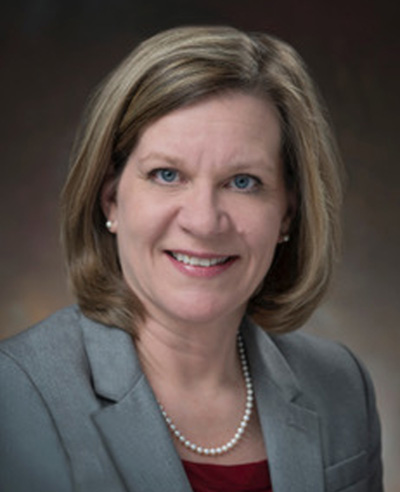
Diane Fremgen
Diane Fremgen’s career with the courts began in 1990 in the Winnebago County Clerk of Circuit Courts Office, where she calculated child support arrears. Since then, she has served as Winnebago County Clerk of Circuit Court (1997-2012), Clerk of the Supreme Court and Court of Appeals (2012-2017), and in her current role as Deputy Director for Court Operations since 2018.
During her tenure as deputy director, Fremgen played a pivotal role in guiding statewide court operations through the pandemic and into recovery, among a number of other significant accomplishments. As clerk of circuit court, Fremgen piloted an eFiling project and oversaw the transition from a heavily paper-based system to electronic case management and eFiling.
Director of State Courts Randy R. Koschnick has announced the hiring of District Court Administrator Holly Szablewski of the First Judicial Administrative District to replace Fremgen effective June 4, 2023.
As she plans for retirement in May, Fremgen provided Third Branch eNews with some perspective on her career and changes in the court system
You’ve held a number of jobs with the court system over the years. Which was your favorite and why?
This is a bit of a trick question because I’ve worked with so many amazing people along the way – they are all my favorites! I think the most rewarding positions were where I could effectuate positive change. Once I was the elected circuit court clerk, I led Winnebago County in the implementation of a number of modernization projects, including the Kids Information Data System (KIDS) in 1997; the implementation of the Consolidated Court Automation Programs’ (CCAP) electronic case management system in 1999; and an eFiling pilot project in 2010. In my current position, I have guided my team and the circuit courts through the pandemic from implementing Zoom to distributing masks and was asked to chair the Chief Justice’s COVID-19 Task Force. In just four weeks, the task force released their final report, which served as a guide to safely restarting in-person hearings and jury trials in Wisconsin – one of the first states in the country to do so.
What other work experience did you have before becoming clerk of circuit court?
I started my career as a payroll and cost accounting clerk for Medalist Industries in Oshkosh in 1985. I took my first job in Winnebago County in April, 1989. I began my career with the county as an account clerk for the public health department and moved to the clerk’s office a year later. Because my education was in accounting, my first position in the clerk’s office was calculating child support arrears for the courts. At the time I decided to run for the office, I was a deputy court clerk for the Hon. Thomas S. Williams.
Why did you decide to run for clerk of circuit court?
Throughout my career I have stayed focused on the big picture. The elected clerk is responsible for the operations of the clerk’s office, and I had ideas. Moving the office from the county’s case and financial management system to CCAP was my initial focus for the office.
What have been the favorite aspects of your job as deputy director?
Leading an incredibly talented team who could find solutions to problems, even in a pandemic, which improved court operations across the state.
What are some of the most significant changes you’ve seen during your time with the courts?
Well, we no longer use typewriters to maintain the court record in the circuit courts. When I started, not only did we have paper files, most of the functions were done manually. The court record, calendars, even financials were created on a typewriter and kept in paper. I think knowing this history has strengthened my understanding of the workflow. My team will tell you when we are problem solving a workflow issue, I often say, “In the paper world it worked like this,” and that has been a great jumping off point to how the CCAP logic should work.
What have been some of the major accomplishments of your office since you became a deputy director?
Supporting a team that inspired both the creation of the data warehouse and the statewide court reporting program. Because of their vision, last month we launched the new circuit court caseload statistical dashboards bringing data visualization to our static statistical reports. Additionally in 2020, we started talking about the concept of having court reporters available to take the record anywhere in the state from any court system facility. The statewide court reporting workgroup was formed and continues to meet today to address the critical court reporter shortage, which is nationwide. The statewide court reporting program has kept Wisconsin Courts on the record.
What will you miss most about being with the courts?
Definitely the people. While the work at times can be challenging, I never got discouraged because I was always supported by great people.
What interests do you have outside of work?
I am looking forward to doing more volunteer work, traveling and finishing a couple books.
What are your future plans?
I’m not sure what the future holds for me. I plan to take some much needed down time over the summer. My husband and I have a trip planned in August, but I suspect by fall I’ll be looking for my next opportunity.
Third Branch eNews is an online monthly newsletter of the Director of State Courts Office. If you are interested in contributing an article about your department’s programs or accomplishments, contact your department head. Information about judicial retirements and judicial obituaries may be submitted to: Sara.Foster@wicourts.gov

